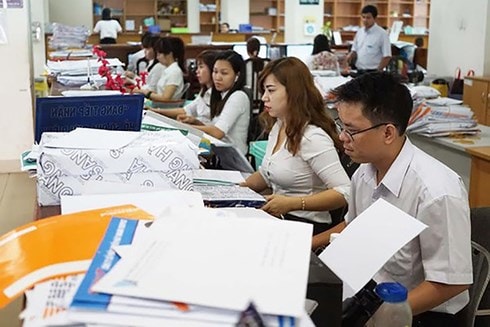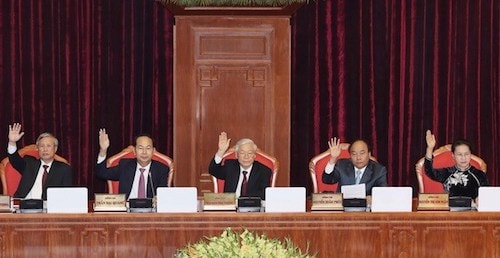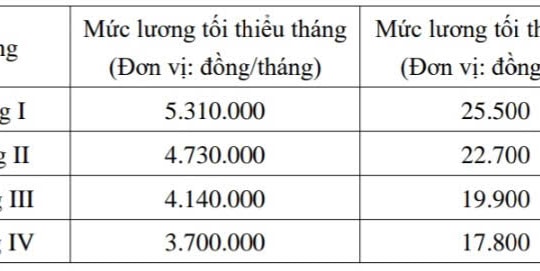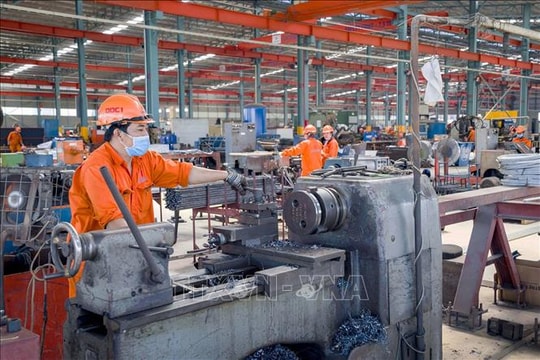Abolish extra-salary income of civil servants
Public agencies and units will have their salary funds allocated, and non-salary income will be eliminated, according to a project recently approved by the Central Government.
On the morning of May 12, at the closing session of the 7th Central Conference of the 12th tenure, the Central Executive Committee passed three resolutions on building cadres at all levels; reforming salary policies; and reforming social insurance policies.
|
The Central Committee unanimously approved three Resolutions in the final working session of the 7th Central Conference. Photo: TTX |
The Central Committee emphasized that the reform of wage policy aims to soon build a scientific, transparent and practical wage system, creating motivation to liberate production capacity, contributing to building a clean political system, preventing and combating corruption and waste...
Specifically, the public sector will build a new salary system, regulating salary levels in absolute amounts according to job positions, titles and leadership positions on the basis of adjusting the lowest salary level and expanding the salary relationship to approach the market sector.
 |
| Civil servants will not receive income outside of their salaries. Photo: Internet |
Thus, there will be a salary table for positions applicable to cadres, civil servants, and public employees in the political system from the central to communal level; a salary table for professional and technical matters applicable to civil servants and public employees who do not hold leadership positions or titles; and three salary tables for the armed forces.
The current allowance regime will be rearranged to ensure that the total allowance fund accounts for a maximum of 30% of the total salary fund. Heads of agencies are allowed to use the salary fund and regular expenses to hire experts and talents; and to use the bonus fund to periodically reward cadres, civil servants and public employees based on the level of work completion.
The pilot mechanism for applying additional income levels has also been expanded in a number of provinces and cities under the Central Government, especially in dynamic regions; at the same time, salary funds are allocated to agencies and units...
The job position system will also be completed to serve as a basis for salary payment. Financial and budgetary solutions and streamlining of the apparatus will be implemented simultaneously with improving the efficiency and effectiveness of the political system and public service units. Non-salary expenses of cadres, civil servants and public employees originating from the state budget will be abolished.
Supplementing regulations on regional minimum hourly wages
For the business sector, the Central Government requires competent authorities to continue to improve the monthly regional minimum wage policy to protect vulnerable workers; at the same time, supplement regulations on hourly regional minimum wages...
Enterprises (including 100% state-owned enterprises) have the autonomy to decide on salary policies (including salary scales, tables, and labor norms) and pay salaries based on labor productivity and production and business efficiency.
For state-owned enterprises, the state regulates salaries through management tools; separates the salaries of state capital representatives from the salaries of the executive board; implements the principle that whoever hires and appoints them will evaluate and pay them...
Increase retirement age according to roadmap
The Central Committee requires further reform in the coming time so that Social Insurance can truly become a pillar of the social security system; gradually and steadily expand towards the implementation of universal social insurance.
A flexible, diverse and internationally integrated social insurance policy system is developed according to the principles of "contribution-benefit," "fairness," "equality," "sharing" and "sustainability."
To ensure the financial balance of the Social Insurance Fund in the long term, the Central Government requests that competent authorities urgently overcome the current unreasonable pension insurance regime in the direction of more flexibility in terms of conditions for benefits, and stricter and more correct regulations on one-time social insurance benefits.
The Central Executive Committee also agreed to increase the average retirement age according to a roadmap, with appropriate steps for each group of people and profession to increase the sustainability of the policy.






.jpg)

